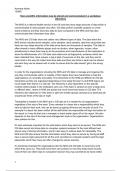Essay
4D How scientific information may be stored and communicated in a workplace laboratory
- Institution
- PEARSON (PEARSON)
I was graded a distinction in all my applied science units, my assignments are extremely well written and contain all the information and pictures you need. If you have any questions do not hesitate to contact me :)I was graded a distinction in all my applied science units, my assignments are extre...
[Show more]



